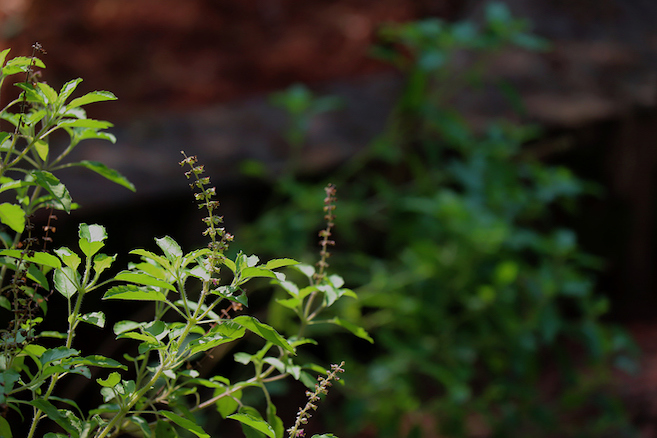
There are a lot of stressors in the world today, and the health of ourselves, communities and the planet reflect that. Some of those stressors are out of your control, while others are not. Changes in technology, economics, family and job pressures are just a few of the external stress culprits. Internal stressors may include spending too much time indoors, high quantities of salt and sugar in your diet, not drinking enough water, sleep disturbances, and self-medicating with alcohol or other substances. According to the CDC, 6 in 10 people in the U.S. suffer from a lifestyle-based chronic disorder like type-2 diabetes, cardiovascular, lung and joint disorders, obesity and certain forms of cancer. These non-communicable diseases (NCD’s) also impact our immunity and outcome during an outbreak of contagious illnesses like the Covid-19 pandemic.
Life is stressful. Ayurveda offers solutions!
Ayurveda, an ancient ‘science of life’, is uniquely poised to help manage stress and prevent disease. As a complementary and alternative (CAM) medicine in the U.S., Ayurveda provides personalized lifestyle guidance and a natural, holistic approach through dietary and lifestyle changes, herbs and cleansing therapies. Ayurveda helps with prevention and disease management, improving life satisfaction and enhancing the quality of your longevity. Its impact can be understood through the mechanism of epigenetics, or external modification of gene expression through changes in lifestyle, digestion, stress and environmental factors which can have a transgenerational impact!

7 ways Ayurveda enriches daily life!
Ayurveda offers many suggestions on how to improve your life and the good news is, they are simple and easy to incorporate into your daily routine. In this blog, we’ll highlight eight ways you can make small adjustments that will result in big improvements for your life.
1. Self awareness: the ultimate approach to self-care
In a world where we are disconnected from ourselves, Ayurveda encourages self-care through understanding our basic nature, our unique Ayurvedic Constitution or Prakriti.
Everything around us is a combination of the five elements: space, air, fire, water and earth. From these elements, the Tridosha or three functional energies emerge: Vata, Pitta and Kapha. At the time of conception, our unchanging Prakriti is formed as a combination of these Doshas, which governs our structure, function, affinities, tendencies and propensity for disorders. The Doshas and their constituent elements are:
- Vata (space and air) or the energy of movement
- Pitta (fire and water) or the energy of transformation
- Kapha (earth and water) or the energy of cohesion
Our Constitution could be of seven types; Vata, Pitta, Kapha or Vata-Pitta, Vata-Kapha, Pitta-Kapha or Vata-Pitta-Kapha. Knowing your constitution is the key to self awareness. It tells you everything you need to know about your habits, preferences, strengths and weaknesses. With this knowledge, you can customize your lifestyle to stay healthier, understand and be your authentic self!
Case study: Elisa, a Vata-predominant dancer
Elisa is a petite, creative dancer prone to anxiety, constipation and fluctuations in energy levels. Knowing that her constitution has a predominance of Vata Dosha, she follows a routine, stays hydrated, enjoys warm meals versus raw salads, and alternates her exercise routine with strengthening and nature walks to prevent burnout.
2. Get ahead of disease with lifestyle shifts that mitigate your imbalances
Lifestyle based disorders are the leading cause of death, disability and healthcare costs in the U.S. Some of their ‘preventable’ causes are poor nutrition, tobacco use, physical inactivity and excessive alcohol consumption. Ayurveda’s three pillars of health (nutrition, sleep and a balanced lifestyle) provide a framework for preventive care.
- Ahara (Nutrition) – Ayurveda considers food as medicine and its paradigm is, you are not what you eat but instead what you digest! Nutrition is personalized based on your constitution and imbalances and it centers around the concept of Shadrasa or six tastes (read more here).
- Nidra (Sleep) – One-third of Americans are sleep deprived and chronic sleep deprivation creates significant health challenges including cardiovascular disease, diabetes, obesity and mental health disorders. Ayurveda encourages following natural biorhythms and balancing Doshas to restore sleep cycles.
- Vihar (Balanced Living) – Ayurveda emphasizes following a middle path while aligning with your ‘Dharma’ or purpose. Lifestyle recommendations include exercise, Yoga and following a routine.
Case Study: Elisa’s Vata-pacifying lifestyle
Elisa’s Ayurvedic provider recommended a Vata-balancing diet, lifestyle, herbs and a personalized exercise regimen with grounding yoga, calming breathwork and a daily Abhyanga, or self-massage. She now makes soups and stews in an Instapot, and eats unctuous food favoring the sweet, sour and salty tastes. Avoiding salads and cold food helps to prevent her Vata Dosha from aggravation. Her go-to dinner is pasta with mozzarella cheese, sauteed veggies, black pepper and a bowl of tomato soup on the side.
While Elisa was an insomniac, she now sleeps better as she’s in bed by 10pm, removes all electronics from the bedroom and practices a restorative yoga routine before retiring.

3. Address your mental and emotional health
More than 50% of Americans will be diagnosed with a mental illness or disorder at some point in their lives. While the 21st century was reeling under an epidemic of stress, the pandemic had a debilitating impact on mental health. Ayurveda as a holistic mind-body science has always addressed the mind in its protocols which de-stigmatizes mental health.
According to Ayurveda, there are three attributes of the mind or Gunas that are in a constant state of flux and are impacted by our diet and lifestyle (read more here).
- Sattva – clear, pleasant, light quality of the mind
- Rajas – restless and ambitious state of mind
- Tamas – heaviness and lethargy
The Doshas in balance also contribute to a pleasant state of mind as do our practices of Yoga and meditation. Ayurvedic recommendations for mental wellness include Sadvritta, a code of conduct similar to psychoneuroimmunology (PNI) in modern medicine which enhances immunity through righteousness, compassion and gratitude!
Case Study: Elisa’s anxiety
Elisa’s mind used to go a mile a minute and she was constantly worried about everything. Her Ayruvedic provider recommended she begin a meditation practice. So instead of reaching for her phone on waking, Elisa now reaches for her yoga mat and sits quietly beside her bed for 5 minutes listening to a guided meditation. And if things get crazy throughout the day, and she feels the anxiety rising, she sits against the dance studio wall and engages in a few minutes of alternate nostril breathing.
4. Align with nature
Ayurveda is intrinsically aligned with nature as a holistic science. Adopting Ayurvedic traditions and rituals can help you connect with your natural rhythms and provide guidance on how to improve your life.
- Environmental sustainability and honoring the elements
- Dinacharya: A daily regimen which includes waking and sleeping with the sun, incorporating a set of hygienic and balancing practices like a daily massage, exercise and a healthy self-care regimen which enhances (inner, outer and lasting) beauty and health
- Ritucharya – A seasonal regimen that involves altering diet and lifestyle based on cues from nature (for instance, here are tips on transitioning from summer to fall)
- Stages of life – Ayurveda honors the stages of life and as the population ages, it provides a beautiful framework to improve health in our sunset years
Case study: Fall was Elisa’s least favorite season
The transition to fall is always difficult for Elisa! Her skin gets dry, insomnia increases, she has aches and pains and anxiety shoots through the roof. She is unable to explain this phenomenon. But Ayurveda recognizes fall as the season of Vata aggravation. From 2-6pm in the afternoon she tends to feel the worst, as well as 2-6am in the morning, when she tosses and turns. Both of these times of day and night are the Vata hours, when Vata Dosha is at its peak. Being mindful to stay on top of her Vata-pacifying rituals before these times helps to ease her difficulties.
5. Enhance your immunity
Immunity was the buzzword during the pandemic. In Ayurveda, immunity or Vyadhikshamatwam is linked with Ojas, our vital life force. Ojas is the net result of digestion and metabolism and it provides you strength. Just as gut health is considered key to health, Ayurveda pays a great deal of attention to enhancement of immunity.
Immunity can be enhanced by preventive measures like sleep, nutrition, lifestyle, cleansing, better mental health and immunomodulatory herbs. Ayurveda focuses on strengthening the host rather than mere disease prevention. Its definition of immunity is comprehensive and includes the ability to resist infections and recover faster when one falls sick.
Case study: Elisa’s allergies
Another reason Elisa always dreaded fall: allergies. Since making the adjustments suggested by her Ayruvedic provider, Elisa has noticed her allergies have gotten much better. Looking for an explanation as to why, she did a little research and what she learned was that allergic reactions begin in the immune system. She then realized that the Ayurvedic changes to her diet and lifestyle must be the factors responsible for her new found immunity.
6. Manage the root of imbalances rather than treating symptoms
What is your Constitution, what imbalances do you have and how can you manage disease? Seek an Ayurvedic Consultation with one of our Senior Vaidyas to find out more and read about what happens in an Ayurvedic Consultation here.

Case study: The root of Elisa’s imbalances
Prior to her Ayurvedic consultation, Elisa had been taking prescription medication for anxiety. While the medicine helped her to somewhat cope, she could always feel anxiety lingering just below the surface. Stronger doses of the medication were recommended, but it just left her feeling more tired and spacey. After several months of engaging in Vata mind calming techniques such as meditation and breathwork, Elisa realized that her anxiety truly seemed to be dissipating.
7. Connect with the entire universe
Ayurveda is a consciousness-based medicine. It believes in the oneness of the universe based on the concept of ‘Vasudev Kutumbakam’ which fosters oneness, harmony with nature, community and being inclusive of diverse populations.
There are three layers of existence, the gross or physical, the subtle and the conscious layer. We incorporate all three in our practice, as described by our Academy Director, Vaidya Jayarajan Kodikannath: “Traditional Ayurveda is clear in that we are part of the collective consciousness; if we can harness, align with, and honor every being with body, mind, and soul; with our physical, functional, and conscious existence, we will get the complete potential of nature for our sustenance to bring health, harmony, peace, happiness, and longevity for all, and fulfill our lives’ purpose.”
Case study: Elisa’s cosmic dance
Although she didn’t notice it before, Eliza’s dance had plateaued. She was going through the motions of old choreography or starting new ideas without being able to complete them. Something shifted at the same time as her anxiety, sleep and digestion started to balance out. She couldn’t put it into words, but she started to feel more connected in her movements. The inspiration was no longer elusive; she felt alive and ready to channel it. What she felt inside was directly reflected in her performance, and she started to receive new offers to perform.
Ayurveda for global health
Ayurveda has a myriad of benefits; it encourages self-care, improves diet, lifestyle, digestion, sleep, immunity, weight management, mental health, longevity, sense of purpose and helps prevent NCDs. It enhances social health and encourages us to take care of the planet. As a preventive science, it is affordable, focused on equity and reduces the burden of disease. For too long now, we have ignored nature. Our own physical and mental health and this sustained Adharma is a cause of Janapadodhwamsa Vyadhis or pandemics and the world is also shaken by war, intolerance and devastation due to climate change.
The unique health challenges during the pandemic have stopped us in our tracks. We are now acutely aware of health inequities and the way we live our lives. Lifestyle disorders don’t just place an economic burden, they cause disease, disability, stress and reduce productivity and potential. As we rebuild with a vision for a healthier, greener planet, Ayurvedic practices can bring universal healing, provide guidelines on how to improve your life and secure a happier and peaceful world.
Om Shanti Shanti Shantihi (May there be peace in all realms)
About the author
-

Anuradha “Anu” Gupta is a NAMACB Certified Ayurvedic Practitioner, Engineer, MBA, Meditator, Writer, 200hr Yoga Teacher and Ayurvedic Doctor. She serves as Guest Faculty Member, Content Specialist and AP Mentor at at Kerala Ayurveda Academy & Wellness Center. She also runs her own Ayurvedic practice, Ayurvedic Footprints.
Anu has an extensive corporate background. She worked for...

